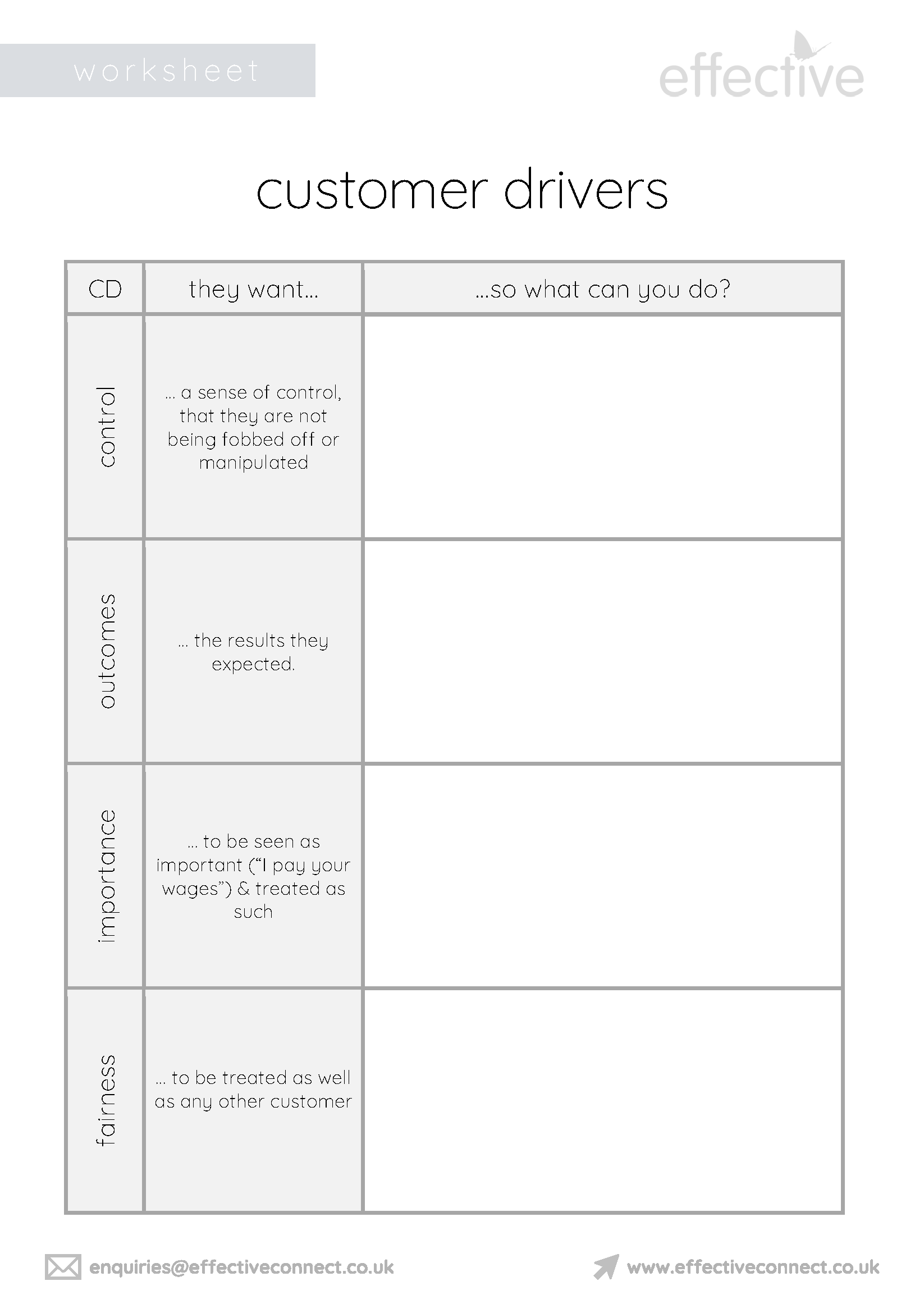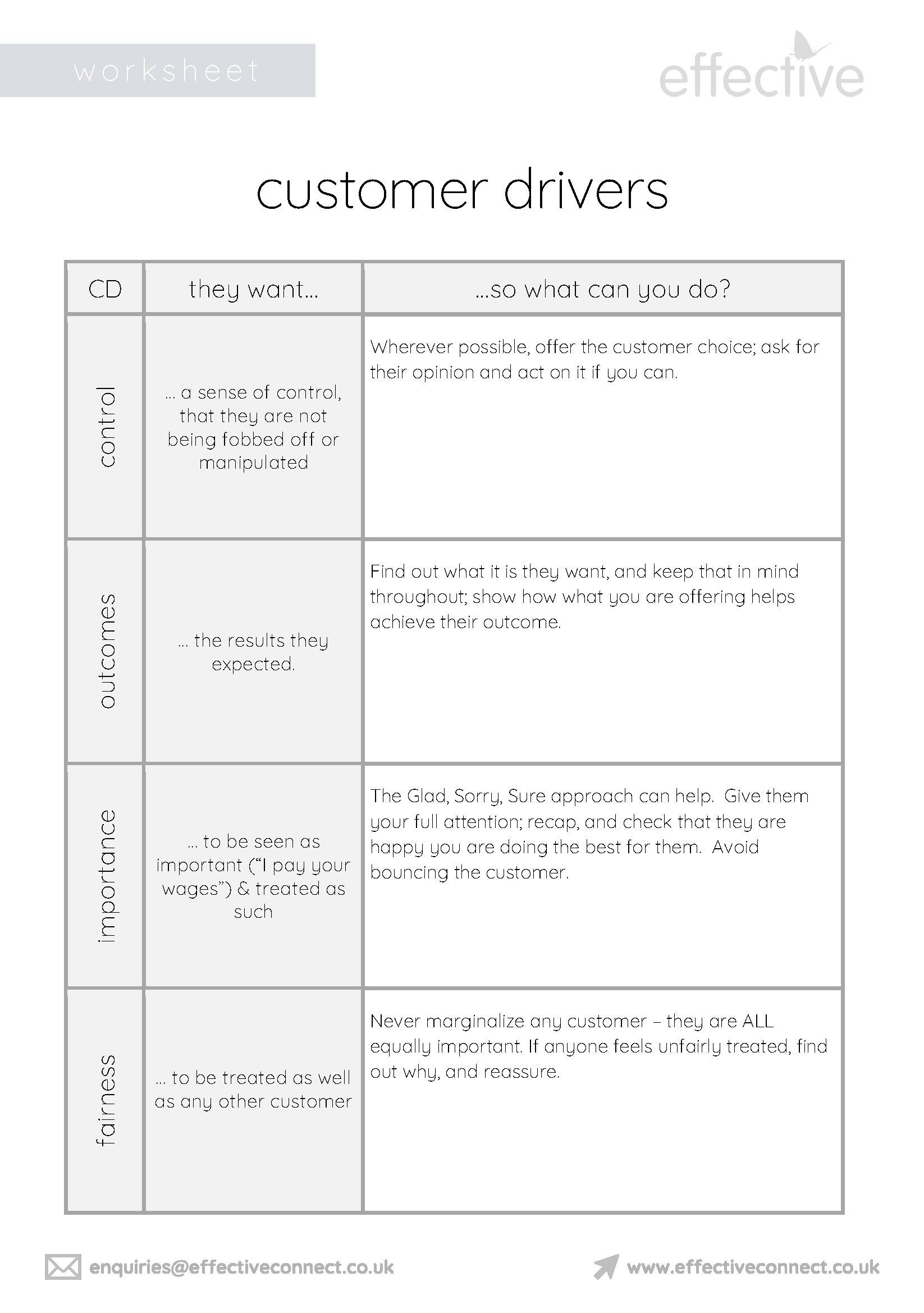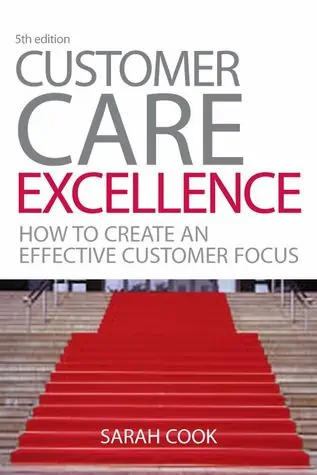
audio 1
Mary Gober, a customer service specialist, has suggested that there are 10 requirements that all customers need in order to feel satisfied and to want to do business with that provider. In addition to the 10, we'll added an 11th right at the end.
So here they are... Mary's top 10 + 1.
Control
They want a sense of control, that they are not being fobbed off or manipulated. Ideally most customer like a choice. Giving the customer a choice – for example, of a time for the order to be delivered; a choice of payment terms; all give the customer a sense of control. Customers also like to be asked questions for the same reason. Would you rather be told how your eggs were going to be cooked, or asked ‘how would you like your eggs?’
Outcomes
They want the results they expected. This means managing the customer’s expectations. Don’t over-promise and under deliver. It is important to clarify any service that is non-standard, such as a special occasion or a one-off. I once had my car serviced and valeted for the same price; it was a special, a one-off – but no-one told me, so that was my expectation when I next took it in for service. When the valet was not provided, what had previously been a delight now turned to disappointment…
Importance
They want to be seen as important (“I pay your wages”) and treated as such. Treat them as important – consider what’s the best you can do for them. Make them feel important. Make them feel comfortable and valued; give them your full attention; offer them a drink if they are waiting or meeting with you. Be interested in them, show you value their custom, and show concern if they have a complaint. Don’t keep the customer waiting, and if they have been waiting, apologise. Think how you would like to be treated – and offer the same to your customer.
Fairness
They wanted to be treated as well as any other customer. One good example is queuing in a supermarket; as customers we hate it if we’re in the wrong queue, so really appreciate it if they open another till, and invite us to go to it. Be careful about offering special discounts ‘for this weekend only’ if other customers have bought at the higher price – ‘that’s not fair’. And something which is fair may not seem so to the customer: if you have been waiting for a home repair for 3 days and see your next door neighbour getting theirs repaired, they will think that is unfair (why them before me?) when in fact they have been waiting for four days….
Friendliness
They want you to be friendly and helpful; they want a warm and pleasant experience. Again, it’s useful to think how you would like to be treated. A number of behaviours typically help: warm and open eye contact, showing interest; introducing yourself; offering a handshake; knowing and using their name; offering a drink; anticipating their needs, and generally making them feel comfortable
Technical Competence
They want you to be an expert in your field. That you are competent and know what you are doing, and have the correct information. They expect you to be knowledgeable, and if you are not, they expect you to be honest, and to either find out quickly or put them directly in touch with the person who knows. And if they have a problem they don’t know how to fix, they expect you to diagnose the problem and find a solution – through a combination of technical knowledge and asking some jargon-free relevant questions. For example you might not know why your car has broken down – that’s why you joined the AA or RAC. And when they arrive, they will either fault find themselves, straight away, or work out what’s wrong by asking helpful questions…
Understanding
They need to be kept informed, to know what is happening, especially if left alone. Have you ever been on a train that has come to a stop in the middle of the countryside – and you’ve sat there waiting, not knowing what’s wrong, or when whatever the problem is will be resolved – so you can phone ahead to give a new estimated time of arrival? Keeping people accurately and regularly informed is a crucial part of any service. And people generally hate waiting, queues, delays or anything that gets in the way of a smooth and expected service. So keeping people informed, ideally through human face to face contact, not only lets people know what’s going on, but prevents a build up of frustration, helplessness and loss of control.
Security
They want to feel safe and secure, emotionally as well as physically. They don’t want to be afraid or at risk. Any customer visiting your offices or site during the dark should feel safe and secure – so lighting and cameras are essential. And many customers still feel intimidated and vulnerable, for example, in entering a ‘posh’ building and talking to highly educated people who seem remote and ‘superior’, and require forms to be filled in that are difficult to read and understand. So do what you can to make the access to and the delivery of your service as easy, welcoming and comfortable as you can.
Belonging
Ideally customers are your allies and advocates; they want to identify with you and what you provide, and to recommend you. A satisfied and pleased customer can become a vital and effective part of your sales force. As a loyal customer, they will not only return when they need the same service again, but recommend you to others. It may be helpful to think of developing such loyalty by informally converting a potential customer to a one-off customer; the one-off customer to a regular customer, and a regular customer to a loyal advocate. If you’ve experienced that journey as a customer, consider what helped you become a loyal advocate – and repeat that experience for your customers
Honesty
They want you to be honest, reliable and trustworthy. This simple rule will help: do what you say you will do, and don’t do what you say you won’t do – or what will disappoint or annoy your customers. If you offer the customer something you can’t deliver, you might have short term success, but much more damaging long term failure – not only a loss of that customer, but damage to your reputation. It’s an important reason why your sales team need to stay close to your production team: whatever you’re selling has to be capable of being delivered…
Customised
They value a service that is tailored to their specific needs. When you deliver standard expectations, then that will satisfy the customer at a basic level. Standard service is, for most customers, no big deal: they can get that anywhere. What makes the difference is customization: giving that particular customer exactly what they asked for, valued or wanted. Service that was over and above the norm, delightful. Delivering everyday standard performance prevents disappointment: adding personalised value generates delight…
Mary Gober's 10 Customer Drivers
( ... and an 11th one added by us! )
They want a sense of control, that they are not being fobbed off or manipulated.

Control
They want the results they expected.

Outcomes
They want to be seen as important...
(“I pay your wages”)
... and treated as such.

Importance
They wanted to be treated as well as any other customer.

Fairness
They want you to be friendly and helpful; they want a warm and pleasant experience.

Friendliness
They want you to be an expert in your field. That you are competent and know what you are doing, and have the correct information.

Technical Competence
They need to be kept informed, to know what is happening, especially if left alone.

Understanding
They want to feel safe and secure, emotionally as well as physically. They don’t want to be afraid or at risk.

Security
Ideally customers are your allies and advocates; they want to identify with you and what you provide, and to recommend you.

Belonging
They want you to be honest, reliable and trustworthy.

Honesty
They value a service that is tailored to their specific needs.

Customised
want more?...
Customer Care Excellence
Sarah Cook
A comprehensive overview, from strategy to front line practical tips
keep reading... open




